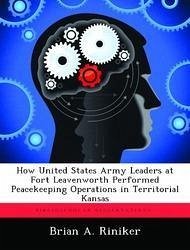The Army in the Kansas Territory (Bleeding Kansas) engaged in what is now called Peacekeeping and Peace-Enforcement Operations. This thesis examines how the Army performed those operations, compares its actions to the United Nations (UN) basic definitions of Peacekeeping, and explores how the lessons learned in Kansas could apply to the modern era. The Army in Kansas faced a major problem: How to regain and maintain peace in a territory that had a population divided over the issue of slavery and local governmental control. This problem was complicated by the existence of two separate territorial governments: One legal (proslavery) but not recognized by the majority of the Kansas population; the other an illegal (antislavery) organization that had greater popularity with the residents of the territory. The Army also had to modify its actions due to several factors: The legality issues of militarily engaging American citizens; the variety of personalities and skills of several territorial governors; the national attention drawn to the conflict; and the other responsibilities the Army faced on the western frontier (Native American and Mormon uprisings). The primary lessons learned were the need to use a professional, disciplined force to stabilize the region, the need for military leadership and civilian leadership to work together to develop solutions to a crisis, and the need for the military to encourage civilian control over political solutions to a crisis.
Hinweis: Dieser Artikel kann nur an eine deutsche Lieferadresse ausgeliefert werden.
Hinweis: Dieser Artikel kann nur an eine deutsche Lieferadresse ausgeliefert werden.








